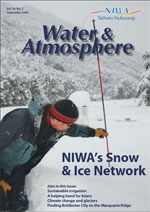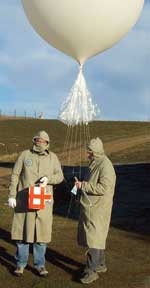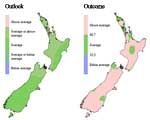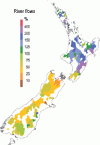PDF of this article (117 KB)




NZMST Teacher Fellow: Len Doel
Len Doel, a teacher from Papatoetoe East Primary School in Auckland, is one of the New Zealand Science, Mathematics and Technology Teacher Fellows working with NIWA staff in 2008. He’s enjoying the opportunity to visit remote sites with NIWA staff in the pursuit of his study topic: the technology that scientists use to gather data in extreme events and environments. His year’s work has encompassed hydrology(flooding), atmospheric chemistry (upper atmospheric research), and oceanography.
It’s a year of contrasts for Len. Consider the excitement, noise, and speed of a helicopter ride to a central North Island alpine region to observe servicing rain gauges in part of NIWA’s hydrological system. Compare that with releasing a meteorological balloon in sunny, crisp, clear conditions in Lauder, Central Otago. As the balloon ascended to over 33 kilometers altitude, lifted by lighter-than air hydrogen gas, the only noise was the beep of tiny instrument sensors. “The difference between the two activities,” says Len, “was like mowing a lawn and then walking into a butterfly house.”
Then there was the challenge and reward of spending almost a month at sea aboard RV Tangaroa, helping multinational teams of scientists gather samples in waters over a kilometre deep. An ’average rough day’ on the Chatham Rise featured 45–50 knot winds and 8–10 metre swell. Fortunately for Len, he found his head and stomach could cope with these trying conditions. He was surprised at the effort required to verify data accuracy and the time it takes to check instrument calibration.
When Len returns to the classroom in 2009, he will adapt concepts of river discharge in urban stream environments to enhance his students’ curiosity and encourage them to observe the world around them. He’ll lead discussions about the use of remote camera technology, and perhaps bring webcam images of undisturbed bird-nesting activity into the classroom. In the computer age, Len has learned the value of clear pencil sketches, legible handwriting, and plain English. His students will be expected to learn these skills in future.
Len says of his experience, “I would like to thank the New Zealand Science, Mathematics and Technology Teacher Fellowship for funding my year with NIWA. It’s been a privilege to have had the time to think of questions and be supported by NIWA staff who took time from their busy days to patiently explain in ways that I could understand. It’s been a most rewarding and memorable year.Thanks again to all involved.”
For further information about Teacher Fellows at NIWA, contact: Dr Julie Hall, 0-4-386 0322, [email protected]
Training at NIWA
NIWA offers courses on a range of topics. We present them at a number of venues according to need and level of interest, and in some instances can include in-house training at your premises. The schedule for 2008/09 is posted online. If you are interested in booking a training course for yourself or your team, check out: www.niwascience.co.nz/edu/training or contact: NIWA Training Coordinator phone 0800 RING NIWA (0800 746 464) or email [email protected]
Courses offered during the remainder of 2008 include:
Introduction to paua farming and water quality, 25–26 September, Wellington
Identifying New Zealand’s native fish, 29–30 October, Hamilton
Managing extreme weather and flooding, 20–21 October, Wellington
Targeted riparian management, 5–6 November, Hamilton
Hydrological statistics, 10 November, Christchurch
Hydrological statistics, 8 December, Hamilton
Introduction to marine aquaculture, 12 December, Wellington
